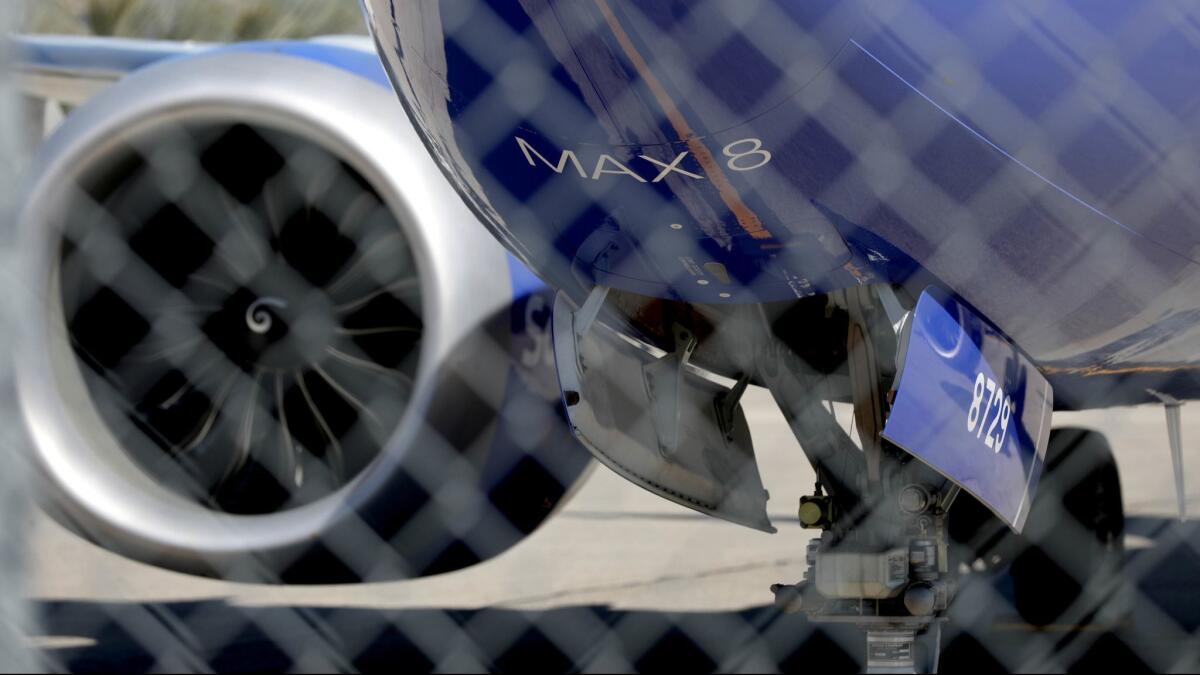Editorial: Why was the FAA so late to deplane from Boeing’s 737 Max?

Talk about leading from behind: The Federal Aviation Administration waited until 51 other countries’ air safety regulators barred flights by Boeing’s 737 Max aircraft before announcing Wednesday that it too would ground the planes indefinitely.
Well, technically, the FAA didn’t announce the move. President Trump did, at an impromptu news conference at the White House on Wednesday. It’s not clear what role, if any, Trump played in the FAA’s decision to issue the emergency order; the order itself says the agency received new information Wednesday that prompted the move.
The agency was expressing confidence in the 737 Max planes as late as Tuesday evening, three days after a second devastating crash within five months involving a freshly minted 737 Max 8. What finally prompted the FAA to act, according to the agency, was “new information from the wreckage” of the second plane and satellite tracking data that indicated “the possibility of a shared cause for the two incidents that needs to be better understood and addressed.”
It’s not clear what role, if any, Trump played in the FAA’s decision to issue the emergency order.
Most other countries evidently felt it was bad enough that two new planes of the same model would crash shortly after takeoff in the clear light of day, one near Indonesia last November and the second in Ethiopia on Sunday. After the first crash, Boeing warned airlines that a new stabilizing system on the plane meant to detect and respond to a dangerous loss of lift could, under some conditions, improperly send the aircraft into a dive. It also planned a software update to address the problem. Then the second crash happened, causing some to worry that the sensor malfunction had claimed both planes.
As it happens, a number of pilots filed complaints with U.S. authorities about the stabilizing system and what they say was the insufficient training provided for it. The FAA may not have reviewed those complaints, however, because the complaint database is maintained by a different agency.
It’s easy to criticize the FAA’s actions with the luxury of hindsight. What’s key for public confidence and public safety, though, is that the agency strike the right balance between two important but sometimes competing wishes: that its decisions be based on solid data and scientific analysis, not emotion or political influence, and that vulnerable travelers be protected against potentially fatal risks. In addition, any move to ground planes throws a monkey wrench into the transportation system, potentially preventing airlines from providing all the flights they’ve committed to making.
It’s also worth remembering that air travel is, statistically, much safer than other modes of transportation. That’s especially true in the United States, which is a testament to both the industry and its regulators here.
To help preserve public confidence in those regulators, it’s important for Congress to examine why the FAA decided not to ground the 737 Max planes until after the software update was completed (reportedly next month), and why it suddenly changed its mind Wednesday. The latter was the right move, but was it made for the right reasons?
Enter the Fray: First takes on the news of the minute »
Trump’s own comments were, as usual, less than reassuring. “I didn’t want to take any chances,” he said, but added, “We didn’t have to make this decision today. We could have delayed it. We maybe didn’t have to make it at all. But I felt it was important both psychologically and a lot of other ways.”
The president isn’t exactly watching from the sidelines on this issue. He spoke to Boeing Chief Executive Dennis Muilenburg by phone Tuesday, and Muilenburg reportedly lobbied against grounding the planes. Trump also has pitched Boeing’s products to foreign leaders; while in Vietnam to negotiate with North Korea’s Kim Jong Un, Trump witnessed a deal by two Vietnamese airlines to buy $15.7 billion worth of Boeing jets, including 100 737 Max models.
Did a president notorious for governing by gut instinct push the FAA one way or another on how to handle the 737 Max crashes? That’s another issue Congress should explore.
Follow the Opinion section on Twitter @latimesopinionand Facebook
More to Read
A cure for the common opinion
Get thought-provoking perspectives with our weekly newsletter.
You may occasionally receive promotional content from the Los Angeles Times.










